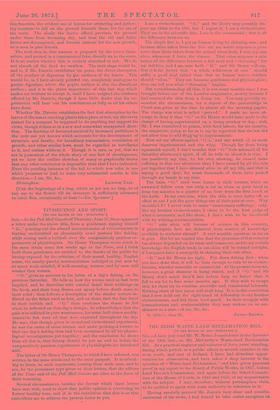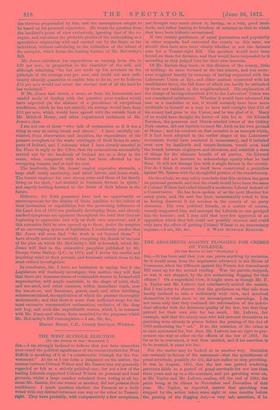THE IRISH WASTE LAND RECLAMATION BILL.
[TO THE EDITOR OF THE "SPECTATOR"]
SIR,—.1 have just read Mr. W. Bence Jones's letter in the Spectator of the 19th inst., on Mr. McCarthy's Waste-land Reclamation Bill. As a practical engineer and valuator of forty years' standing, during which period, as a public officer in several counties in the west, south, and east of Ireland, I have had abundant oppor- tunities for observation, and have taken a deep interest in the question of " Waste-land Reclamation," and have given practical proof in my report to the Board of Public Works, in 1837, before Lord Devon's Commission, and again before the Select Commit- tees of the House of Lords, in 1849 and 1853, of my acquaintance with the subject. I may, therefore, without presumption claim to be entitled to speak with some authority in reference to it.
Having carefully perused Mr. Jones's very clear and sensible statement of his views, 1 feel bound to take entire exception to
the theories propounded by him, and the assumptions sought to be based on his personal experience. He treats the question from the landlord's point of view exclusively, ignoring that of the oc- cupier, and calculates the probable profits of the undertaking as a speculation originating with and carried out by the State, or the individual, without calculating on the utilisation of the labour of the occupier, which forms the leading feature of Mr. McCarthy's BilL Mr. Jones calculates his expenditure as varying from 20s. to £20 per acre, in proportion to the character of the soil, and although admitting "he has not made up his accounts on the principle of the average cost per acre, and could not now suffi- ciently identify quantities to enable him to do so, yet he believes £15 per acre would not cover the average cost of all the land he has reclaimed."
If Mr. Jones had struck a mean, as from his honourable and candid mode of dealing with the question your readers would have expected (in the absence of a prevalence of exceptional conditions, which he has not stated), his average would have been £10 per acre, which would have agreed with the outside limit of Mr. Mitchell Henry, and other experienced reclaimers of Mr. Jones's class.
I am not one of those "who talk of reclamation as if it was a thing as easy as eating bread and cheese." I have carefully cal- culated, from observation and inquiries, the expenditure of the
peasant occupiers on the waste curtilages of their farms in many parts of Ireland, and-I reiterate what I have already asserted in
the Times in reply to Mr. Clive, that the reclamations successfully carried out by the landlords of Ireland are as a drop in the ocean, when compared with what has been effected by the occupying tenants, and at half the cost.
The landlords, like Mr. Jones' employ expensive stewards, a large staff, costly machinery, and hired labour, and horse-work. The tenant employs his own strong arms and those of his family living on the spot, "not slothful in business, fervent in spirit," and eagerly looking forward to the fruits of their labour in the future.
Hitherto, the Irish peasantry have had no opportunity or encouragement for the display of those qualities to the extent of
their inclination or capabilities, but the protecting influences of the Land Act of 1870 are gradually developing them, and already marked symptoms are apparent throughout the land that they are beginning to appreciate and rely on their own resources ; and if this extensive field be now opened up to them, under the auspices of an encouraging system of legislation, I confidently predict that Mr. Jones will soon find "the work is not beyond them." I have already assisted in carefully compiling the details of the cost of the plan on which Mr. McCarthy's Bill is founded, which Mr. Jones will find in the exhaustive pamphlet published by Mr. George Orme Malley, QC., in 1874, and I invite his candid and inquiring mind to their perusal, and fearlessly submit them to his most critical investigation.
In conclusion, Sir, I have no hesitation in saying that if the Legislature will fearlessly investigate this matter, they will find that there are immense tracts of reclaimable wastes in Ireland still unproductive, with ample materials, in the shape of coral, shell, and sea-sand, and other manures, within immediate reach, near the sea-shore, and limestone, gravel, marl, and other fertilising substances inland, the application of which the peasant thoroughly understands ; and that there is more than sufficient scope for the most extensive remunerative reclamation, exclinive of the deep red bog, and such-like unprofitable wastes, which I, in common with Mr. Jones and others, deem unsuited for the purposes which Mr. McCarthy's Bill contemplates.—I am, Sir, &c., HENRY Bnxrr, C.E., County Surveyor, Wicklow.



































 Previous page
Previous page